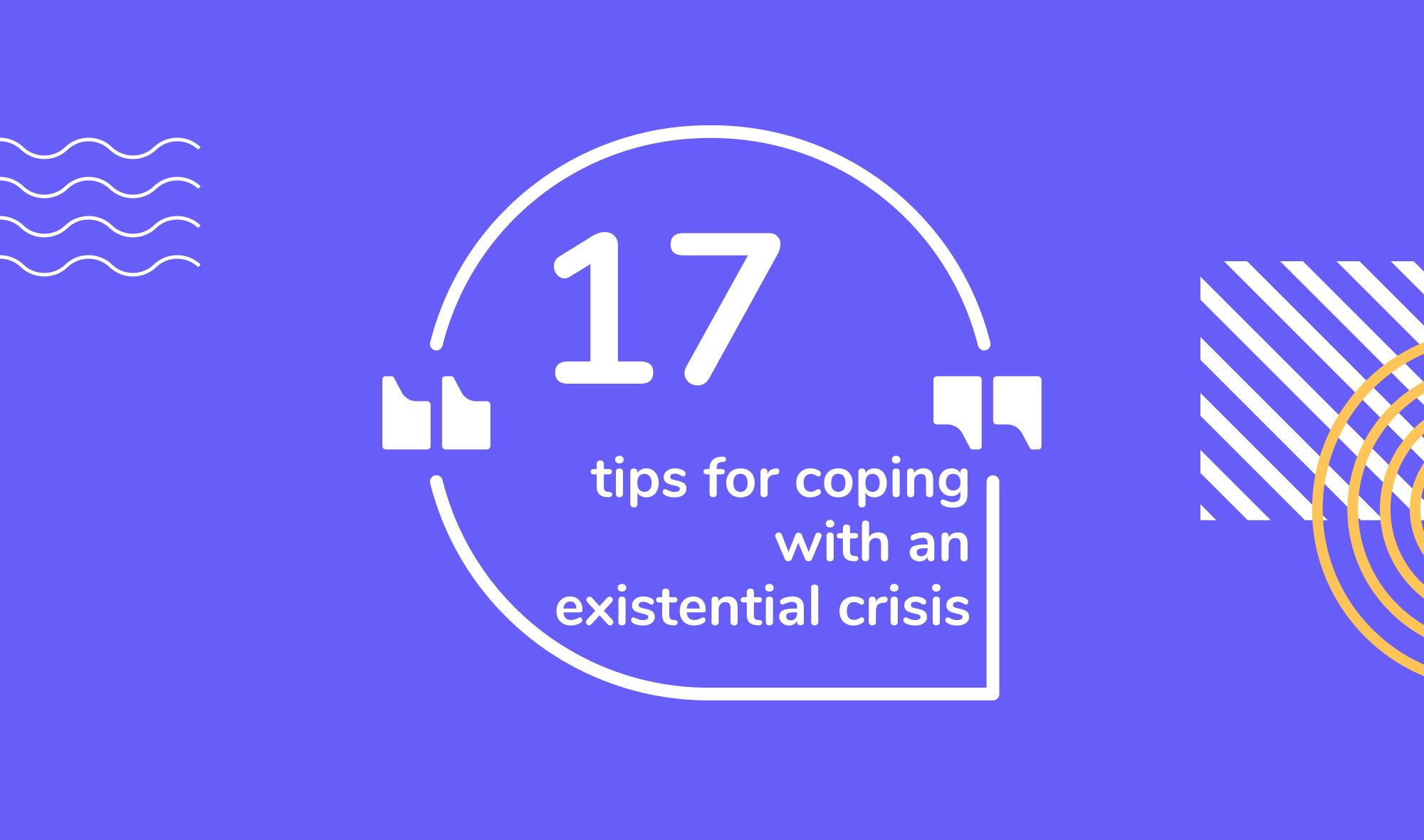Navigating the unknown: strategies for coping with existential dread
By Marco Franzoni • May 23, 2023
Key Takeaways
- Existential dread is a normal part of the human experience, but it can be challenging to cope with.
- Accepting the uncertainty of life and seeking meaning in adversity can help us build resilience and find purpose in our struggles.
- By embracing the journey of personal growth and seeking support from mental health professionals and other resources, we can develop a more positive and authentic way of living.

Existential dread is a complex and challenging emotion that many of us experience at different stages of our lives. It's that gnawing feeling that something is missing, that life is meaningless, and that we're adrift in a world that we can't control. It's a sense of unease that can lead to anxiety, depression, and even suicidal thoughts.
But existential dread isn't necessarily a negative thing. It can also be an opportunity to reflect on our lives and discover what truly matters to us. In this post, we'll explore the meaning of existential dread, its causes, and its impact on mental health. We'll also share practical tips and strategies for coping with an existential crisis, so that you can emerge from this experience with a more meaningful life.
Whether you're going through a sophomore crisis, an adult existential crisis, or simply struggling with your own meaning and purpose, this post is for you. By the end, you'll have a better understanding of how to navigate the complex issues of the human experience and find meaning in your own life. So let's dive in!
Join our Newsletter
Transform your career with our personal growth insights. Get one valuable tip right in your inbox every Saturday morning.
Understanding existential dread

What is existential dread?
Existential dread is a feeling of anxiety and unease that can arise when we contemplate the search for meaning and purpose in life. It can be a normal part of the human experience, but it may become a problem if it becomes overwhelming or interferes with daily life.
Some common symptoms of existential dread include feelings of emptiness or detachment, a sense of being lost or adrift, and a feeling that life lacks meaning. For some people, existential dread may manifest as a fear of their own death, or a fear of the unknown.
It's important to recognize that existential dread is different from other forms of anxiety or depression. While other forms of anxiety may be related to specific situations or events, existential depression or dread is often related to the larger questions and concerns of life, such as the meaning of existence or the purpose of our lives.
What causes existential dread?
There are many different factors that can contribute to feelings of existential dread. Life transitions and major life events, such as the death of a loved one or a job loss, can trigger existential questions and concerns. Our culture and societal expectations can also impact our sense of purpose and contribute to feelings of existential dread. For example, many people feel pressure to achieve certain goals or milestones by a certain age or stage in life.
Personal relationships and family dynamics can also contribute to existential dread. A lack of meaningful connections with others in family life or feeling like we don't have a sense of belonging can amplify feelings of emptiness and isolation.
How does existential dread affect us?
Existential dread can have a significant impact on mental health, leading to feelings of anxiety, depression, or hopelessness. It may also impact a person's relationships, job satisfaction, and sense of self. For example, a person who is struggling with existential dread may have difficulty finding meaning in their work or feeling connected to their colleagues. Experiencing existential dread can make your work life difficult, however, learning to manage anxiety at work can provide some relief.
However, exploring existential questions and thoughts may also lead to a deeper sense of purpose and the meaning of life. By acknowledging the uncertainty and impermanence of life, we can gain a greater appreciation for the present moment and find joy in small moments. We may also become more motivated to pursue goals that align with our values and beliefs.
If you find yourself struggling with existential dread, there are a number of things you can do to cope. One helpful strategy is to track your daily habits. This can help you identify patterns and make changes to improve your mental well-being.
Recognizing existential dread

Recognizing the signs and symptoms of existential dread is an important first step in coping with this feeling. Some common signs and symptoms include a feeling of restlessness or unease, a sense of detachment from others, or a sense of being lost or directionless in life.
People experiencing existential dread may feel like they are stuck in a rut or unable to make meaningful progress in their lives. They may feel isolated and also have difficulty finding joy or satisfaction in things that used to bring them happiness. In some cases, existential dread may be accompanied by physical symptoms such as fatigue, changes in appetite, or difficulty sleeping.
It's important to note that these symptoms can also be indicative of other conditions, such as depression or anxiety. However, if these symptoms persist and are accompanied by a sense of meaninglessness or detachment from life, it may be a sign of existential dread.Distinguishing existential dread from other emotions
Distinguishing existential dread from other emotions can be challenging, as many of the symptoms of existential thoughts may overlap with other mental health conditions. However, one key difference is that existential dread is often related to broader questions about the meaning and purpose of life, rather than specific events or situations.
For example, someone experiencing anxiety related to a job interview or public speaking engagement may feel symptoms such as nervousness or a racing heart. Someone experiencing existential dread, on the other hand, may feel a sense of emptiness or detachment from everyday life, that is not related to any specific event or situation.
It's also important to note that existential dread is not always negative. While it can be distressing at times, it can also be a source of motivation and inspiration to explore deeper questions about the human experience. By learning to distinguish existential dread from other emotions, we can better understand its impact on our lives and take steps to address it.
Accepting the existential dilemma

Acknowledging the inevitability of uncertainty
One of the core aspects of existential dread is the uncertainty that comes with the search for meaning and purpose for an authentic life. It's important to acknowledge that uncertainty is an inevitable part of life, and that there are many questions that may never have clear answers.
By acknowledging the inevitability of uncertainty, we can learn to embrace the unknown and find comfort in the knowledge that we are not alone in our struggles. This can help to reduce feelings of isolation and anxiety, and create a sense of connection to the larger human experience.
Embracing the unknown
Rather than fearing the unknown, we can learn to embrace it as an opportunity for growth and discovery. By stepping outside of our comfort zones and exploring new ideas and experiences, we can challenge ourselves to grow and learn in ways we never thought possible.
For example, someone experiencing an existential crisis may benefit from trying new hobbies or activities, traveling to new places, or exploring different philosophical perspectives. By exposing themselves to new experiences and ideas, they may find new sources of inspiration and meaning.
Recognizing the value of existential dread
While existential dread can be distressing at times, it can also be a valuable tool for personal growth and self-discovery. By confronting difficult questions and exploring the unknown, we can gain a deeper understanding of ourselves and our place in the world.
For example, someone experiencing an existential crisis may benefit from taking time to reflect on their values and beliefs, and exploring ways to live a more authentic and meaningful life. They may also benefit from seeking out support from loved ones, mental health professionals, or support groups.
If you're struggling to cope with existential dread, one helpful strategy is to engage in self-reflection. This can help you to better understand your thoughts, feelings, and motivations, and to develop a more positive and authentic way of living. There are many different ways to engage in self-reflection, and one helpful tool is to ask yourself questions. That can also help you find balance in your life.
17 tips for coping with an existential crisis in your own life

If you're experiencing an existential crisis, it's important to know that you're not alone. There are many strategies that can help you cope with the uncertainty and anxiety that comes with this experience. Here are 17 tips for coping with an existential crisis in your own life:
Define your meaning and purpose
One of the most powerful ways to cope with existential dread is to define your own meaning and purpose in life. This can involve reflecting on your values and beliefs, and exploring ways to live a more meaningful and fulfilling life.
Some strategies for finding your own meaning and purpose include:
- Developing a personal philosophy or mission statement
- Engaging in activities that align with your values and beliefs
- Seeking out experiences that challenge you and help you grow
- Cultivating a sense of spirituality or connection to something greater than yourself
By defining your own meaning and life purpose, you can gain a sense of direction and motivation, and find greater fulfillment in your daily life.
Build resilience
Building resilience is an important part of coping with an existential crisis. Resilience involves developing the skills and mindset to bounce back from adversity and overcome challenges.
Some strategies for building resilience include:
- Developing coping skills, such as mindfulness or relaxation techniques
- Embracing change and viewing challenges as opportunities for growth
- Learning from failure and using setbacks as a chance to learn and improve
- Cultivating a growth mindset and focusing on progress rather than perfection
By building resilience, you can develop the strength and confidence to overcome obstacles and pursue your goals, even in the face of uncertainty.
Seek support
Seeking support from others is an important part of coping with an existential crisis or serious illness. This may involve building strong relationships with family and friends, or seeking professional help from a mental health professional.
Some strategies for seeking support include:
- Building strong personal relationships and social connections
- Joining a support group or seeking individual therapy
- Reaching out to trusted friends or family members for emotional support
- Connecting with others who are going through similar experiences
By seeking support, you can gain perspective, validation, and guidance as you navigate the challenges of an existential crisis.
Join our Newsletter
Transform your career with our personal growth insights. Get one valuable tip right in your inbox every Saturday morning.
Prioritize self-care
Taking care of your own physical and mental health is essential for coping with an existential crisis. Self-care involves developing healthy habits and managing stress in a way that promotes well-being.
Some strategies for prioritizing self-care include:
- Developing a healthy sleep routine
- Engaging in regular exercise or physical activity
- Eating a healthy and balanced diet
- Managing stress through relaxation techniques, such as meditation or yoga
By prioritizing self-care, you can improve your mood, increase your energy levels, and reduce your overall stress.
Stay grounded
Staying grounded and present in the moment is an important part of coping with an existential crisis. Grounding techniques can help you feel more connected to the present moment and reduce feelings of anxiety or detachment.
Some strategies for staying grounded include:
- Practicing mindfulness or meditation
- Using your senses to connect with your surroundings, such as feeling the texture of objects or smelling different scents
- Engaging in activities that promote relaxation, such as taking a bath or going for a walk in nature
By staying grounded, you can reduce feelings of anxiety and detachment, and find greater peace and connection in your daily life.
Manage your anxiety
Anxiety is a common symptom of existential crises and dread, and learning to manage anxiety can be an important part of coping with an existential crisis. There are many strategies for managing anxiety, ranging from lifestyle changes to therapy and medication.
Some strategies for managing anxiety include:
- Developing healthy coping mechanisms, such as journaling or creative expression
- Addressing anxiety through talk therapy or cognitive behavioral therapy
- Using relaxation techniques, such as deep breathing or progressive muscle relaxation
- Considering medication or other medical treatments for severe or persistent anxiety
By managing your anxiety, you can reduce feelings of stress and anxiety, and develop the tools to cope with the uncertainty and challenges of an existential crisis.
Reframe negative thoughts
Negative thoughts and self-talk can be a major source of anxiety and distress in an existential crisis. Reframing negative thoughts involves challenging negative beliefs and focusing on more positive and empowering perspectives.
Some strategies for reframing negative thoughts include:
- Challenging negative self-talk and replacing it with more positive affirmations
- Practicing gratitude and focusing on the positive aspects of your life
- Reframing negative events as opportunities for growth and learning
- Focusing on the present moment and letting go of worries about the future
By reframing negative thoughts, you can reduce feelings of anxiety and stress, and cultivate a more positive and resilient mindset.
Find inspiration
Seeking out inspiration from art, literature, and other sources can be a powerful tool for coping with an existential crisis. Inspiration can help you feel more connected to something greater than yourself, and provide a sense of hope and motivation.
Some strategies for finding inspiration include:
- Exploring different philosophical or spiritual traditions
- Reading literature or watching films that explore existential themes
- Engaging with art or music that resonates with you
- Seeking out stories of individuals who have overcome challenges or found meaning in difficult circumstances
By finding inspiration, you can tap into your deepest thoughts and feelings, and connect with the human experience in a meaningful way.
Letting go of control
One of the core aspects of an existential crisis is the recognition of the limits of our own control. Letting go of the need for control can be a powerful tool for coping with existential anxiety and dread, and finding greater peace and acceptance in life.
Some strategies for letting go of control include:
- Practicing mindfulness and focusing on the present moment
- Embracing uncertainty and the unknown
- Cultivating a sense of acceptance and non-judgment toward your experiences
- Letting go of the need for perfection or certainty in all aspects of life
By letting go of control, you can reduce feelings of stress and anxiety, and find greater acceptance and peace in your daily life.
Embracing impermanence
Recognizing the impermanence of all things can be a challenging but important part of coping with an existential crisis. Embracing impermanence can help you find greater peace and acceptance in the face of uncertainty and change.
Some strategies for embracing impermanence include:
- Reflecting on the impermanence of all things, including relationships, possessions, and life itself
- Cultivating a sense of detachment and non-attachment to material things
- Finding beauty and meaning in the transience of life and the natural world
- Recognizing that impermanence can be a source of renewal and growth
By embracing impermanence, you can reduce feelings of anxiety and stress, and find greater peace and acceptance in your daily life.
Connecting with others
Building connections with others is an important part of coping with an existential crisis. Connection can provide a sense of validation, support, and guidance, and help you feel less isolated in your struggles.
Some strategies for connecting with others include:
- Building strong personal relationships with family and friends
- Joining a support group or therapy group for individuals going through similar experiences
- Volunteering or engaging in other activities that allow you to connect with others and give back to your community
- Cultivating empathy and compassion for others, and seeking to understand the experiences of those around you
By connecting with others, you can reduce feelings of isolation and disconnection, and find greater support and guidance as you navigate the challenges of an existential crisis.
Find a community
Finding a community of like-minded individuals can be an important part of coping with an existential crisis. Community can provide a sense of belonging, shared purpose, and a source of inspiration and motivation.
Some strategies for finding a community include:
- Joining a community group or organization that aligns with your values and interests
- Attending events or activities that allow you to meet like-minded individuals
- Participating in online forums or groups related to your interests or struggles
- Seeking out mentors or role models who can provide guidance and support
By finding a community, you can find a sense of shared purpose and belonging, and tap into the support and guidance of like-minded individuals.
Seek meaning in adversity
Finding meaning in difficult experiences can be a powerful tool for coping with an existential crisis. By seeking meaning in adversity, you can find a sense of purpose, focus and motivation, and develop a more positive and resilient mindset.
Some strategies for seeking meaning in adversity include:
- Reflecting on the lessons and growth opportunities presented by difficult experiences
- Finding ways to give back or help others who are facing similar challenges
- Seeking out spiritual or philosophical guidance that provides a sense of purpose and direction
- Reframing difficult experiences as opportunities for growth and self-discovery
By seeking meaning in adversity, you can find a sense of purpose and direction, and develop a more positive and resilient mindset in the face of challenges.
Maintain perspective
Maintaining perspective is an important part of coping with an existential crisis. By stepping back and taking a broader view of life changes and experiences, you can gain a deeper understanding of yourself and your place in the world.
Some strategies for maintaining perspective include:
- Practicing self-reflection and journaling to gain insight into your thoughts and feelings
- Seeking out diverse perspectives and viewpoints through reading, conversation, or travel
- Engaging in activities that allow you to connect with nature or the larger world, such as hiking or travel
- Seeking guidance from mentors, role models, or mental health professionals
By maintaining perspective, you can gain a deeper understanding of yourself and your place in the world, and develop a more grounded and resilient mindset.
Cultivating gratitude
Cultivating gratitude can be an important tool for coping with an existential crisis. By focusing on the positive aspects of your life and cultivating a sense of appreciation, you can reduce feelings of stress and anxiety, and find greater joy and fulfillment in your daily life.
Some strategies for cultivating gratitude include:
- Practicing mindfulness and focusing on the present moment
- Keeping a gratitude journal and reflecting on the positive aspects of your life
- Engaging in acts of kindness or giving back to others
- Cultivating a sense of appreciation for the small things in life
By cultivating gratitude, you can reduce feelings of stress and anxiety, and find greater joy and fulfillment in your daily life.
Utilize resources
Utilizing resources can be an important part of coping with an existential crisis. By seeking out information and guidance, you can gain new insights and strategies for coping with your struggles.
Some resources that may be helpful include:
- Books and articles on topics related to existentialism, spirituality, and personal growth
- Mental health resources, including talk therapy, medication, and support groups
- Online forums and communities where you can connect with others facing similar struggles
- Spiritual or philosophical texts and teachings
By utilizing resources, you can gain new insights and strategies for coping with an existential crisis, and find a sense of support and guidance in your struggles.
Additionally, exploring different ways to express gratitude can be a powerful tool for finding meaning in challenging times. Check out this post on 100 Ways to Express Gratitude for an extensive list of ideas to show appreciation in various aspects of your life, or this post on Erikson's Stages of Psychosocial Development Explained for a deeper understanding of the psychological stages we go through in life.
Embrace the journey
Finally, it's important to remember that coping with an existential crisis is a journey, not a destination. By embracing the journey and focusing on the process of growth and self-discovery, you can find greater meaning and purpose in your struggles.
Some strategies for embracing the journey include:
- Practicing self-compassion and accepting your own imperfections and struggles
- Recognizing that setbacks and challenges are a natural part of growth and change
- Focusing on the present moment and finding joy and fulfillment in the journey itself
- Cultivating a sense of curiosity and wonder about the world and your own experiences
By embracing the journey, you can find greater meaning and purpose in your struggles, and develop a more positive and resilient mindset for the future.
Discover the power of embracing a growth mindset in the face of adversity. Learn how to overcome victimhood and take control of your life by developing resilience and a positive attitude.
Conclusion
In conclusion, existential dread is a complex and challenging experience Male midlife crisis stages can be another facet of existential dread, and understanding them can provide valuable insights into navigating this challenging phase of life that can leave us feeling lost, confused, and overwhelmed. Coping with an existential crisis requires patience, self-reflection, and a willingness to embrace uncertainty and change.
Throughout this post, we've explored a variety of strategies for coping with existential dread, from building resilience and seeking support, to finding meaning in adversity and embracing the journey of personal growth.
While there's no one-size-fits-all approach to coping with an existential crisis, the tips and strategies outlined in this post can provide a useful framework for navigating this challenging experience in your own life.
Remember that seeking the guidance of mental health professionals, such as therapists or counselors, can be an important part of coping with an existential crisis. Don't be afraid to reach out for help if you're struggling with feelings of anxiety, depression, existential guilt, or hopelessness.
Above all, remember that coping with an existential crisis is a journey, not a destination. By embracing the journey and focusing on growth and self-discovery, you can find greater meaning and purpose in your struggles, and develop a more positive and authentic way of living.
So take heart, and know that you're not alone in your struggles. By embracing the unknown and finding the courage to confront your deepest fears and doubts, you can build a more meaningful and fulfilling life, and discover the beauty and richness of the human experience.
For more insights on navigating challenging emotional experiences, including gaslighting and its effects, you can explore our post on unveiling the dark art of gaslighting.
Read more about: Existential Crisis